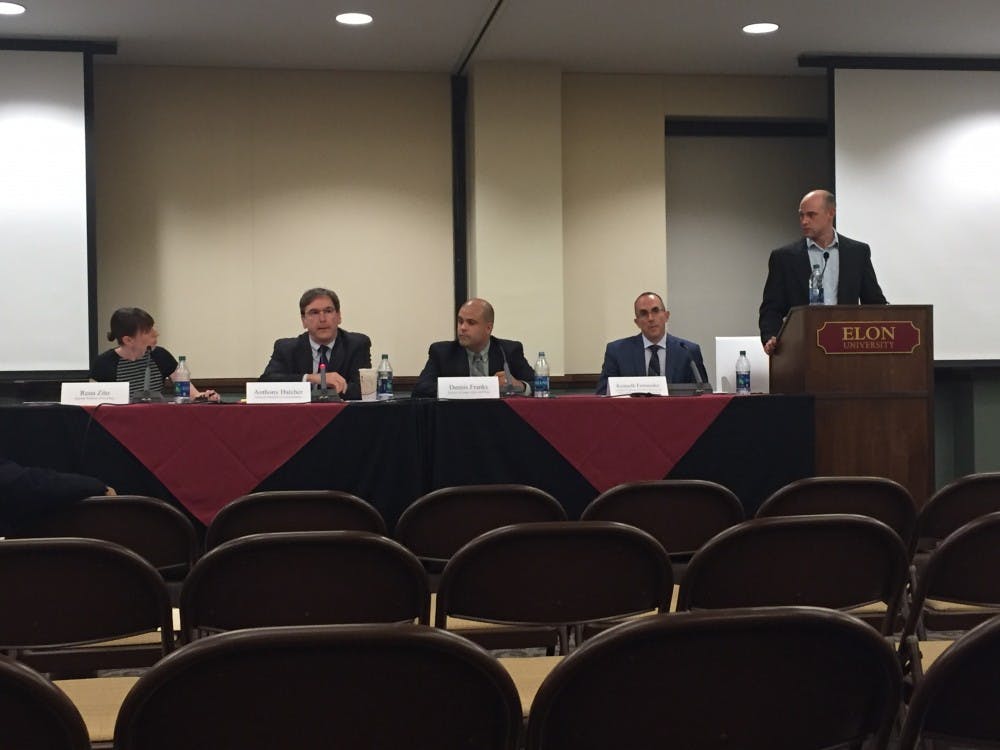After more than an hour of gun violence discussion Wednesday evening in Upstairs Lakeside at Elon University, many audience and panel members lingered to continue a discussion cut short because of time limits. Despite the audience filling less than half the seats available, they had no shortage of questions for the four faculty panelists.
Much of the discussion focused on the culture surrounding guns in the United States and its possible effects on violence, rather than a debate of gun control measures. That conversation built off the current momentum of the national conversation in the wake of recent shootings at U.S. colleges.
Jason Husser, assistant professor of political science and policy studies and assistant director of the Elon University Poll, hosted Elon faculty and staff from different areas of expertise to answer questions about complicated factors of gun violence, especially mass shootings.
“This is one of Elon’s many commitments to fostering a broader dialogue on issues, not just gun control," he said.
Husser began with references to recent shootings on college campuses, especially Umpqua Community College in Roseburg, Oregon, and showed President Barack Obama’s video response. Obama's address set the tone for a somber discourse — audience members expressed their shared confusion and frustration over gun culture in the United States.
Husser emphasized that this event was meant to be a two-way dialogue between panelists and community members, encouraging the audience to ask questions and contribute to the conversation. Throughout the panel discussion, which lasted just over an hour, panelists emphasized how difficult it is to have these conversations in a way that is non-argumentative and non-divisive. They also recognized that there is no widely-recognized root of the problem, just as there is no obvious solution.
“The story shouldn’t begin and end with guns, nor with mental health,” said panelist Rena Zito, assistant professor of sociology. “It has to be about us culturally, and without that we miss the broader point, that is, what is going on culturally?”
Several audience members and panelists addressed their concerns specifically with the “gun culture” that seems to have grown out of the Second Amendment. Panelist Kenneth Fernandez, assistant professor of political science and policy studies and director of the Elon University Poll, questioned the possibility of changing “our violent culture or gun culture.”
“I think we’re not going to stop talking about this,” Fernandez said. “We’re going to keep talking about this issue, and maybe eventually we’ll start see it as a public health issue, and maybe we will be able to get towards a middle ground. Right now it seems as if there’s a polarization, but I think eventually we’ll calm our heads, we’ll eventually be able to push legislation that can have compromise.”
Compromise was a widely-discussed topic during the panel. Fernandez suggested background checks, waiting periods, education and gun safety training as possible compromises that are “not restrictive, trying to take away your guns, but common sense protections that protect you and your family and your loved ones.”
Panelist Dennis Franks, director of Campus Safety and Police, said certain restrictions seem “rational” to him, such as waiting periods and background checks. According to Franks, people can only fall into one of two restrictive categories: gun-lovers and gun-haters. He said both sides of the argument utilize scare tactics to drum up support, which further polarizes the issues and prevents anyone from wanting to “step in the middle.”
“There has to be middle ground. It almost seems that each side wants to draw a line in the sand and no one can cross it,” Franks said. "There’s got to be middle ground, and there’s got to be good solutions to these issues, and I do think that certain groups take advantage of that and they use fear to make people think they can’t exercise their constitutional rights.”
Panelist and Associate Professor of Communications Anthony Hatcher shared a story of the backlash and including “nasty threats” he received after writing a column following a mass shooting in which he suggested what Obama should say in light of the events.
“It’s hard, hard, hard to discuss it in this country,” he said.
In their closing statement, the panelists encouraged the audience to continue to have conversations about difficult topics like gun violence.
“I hope moving forward you will, when you have these conversations, hopefully with your friends and other people in your life, that you’ll figure out a way to talk about these things that move beyond the basic narratives we hear that focus almost exclusively on guns and mental health, and think about those cultural factors and make sure that you’re thinking beyond just the general stories that we’re accustomed to hearing on these topics,” Zito said.


